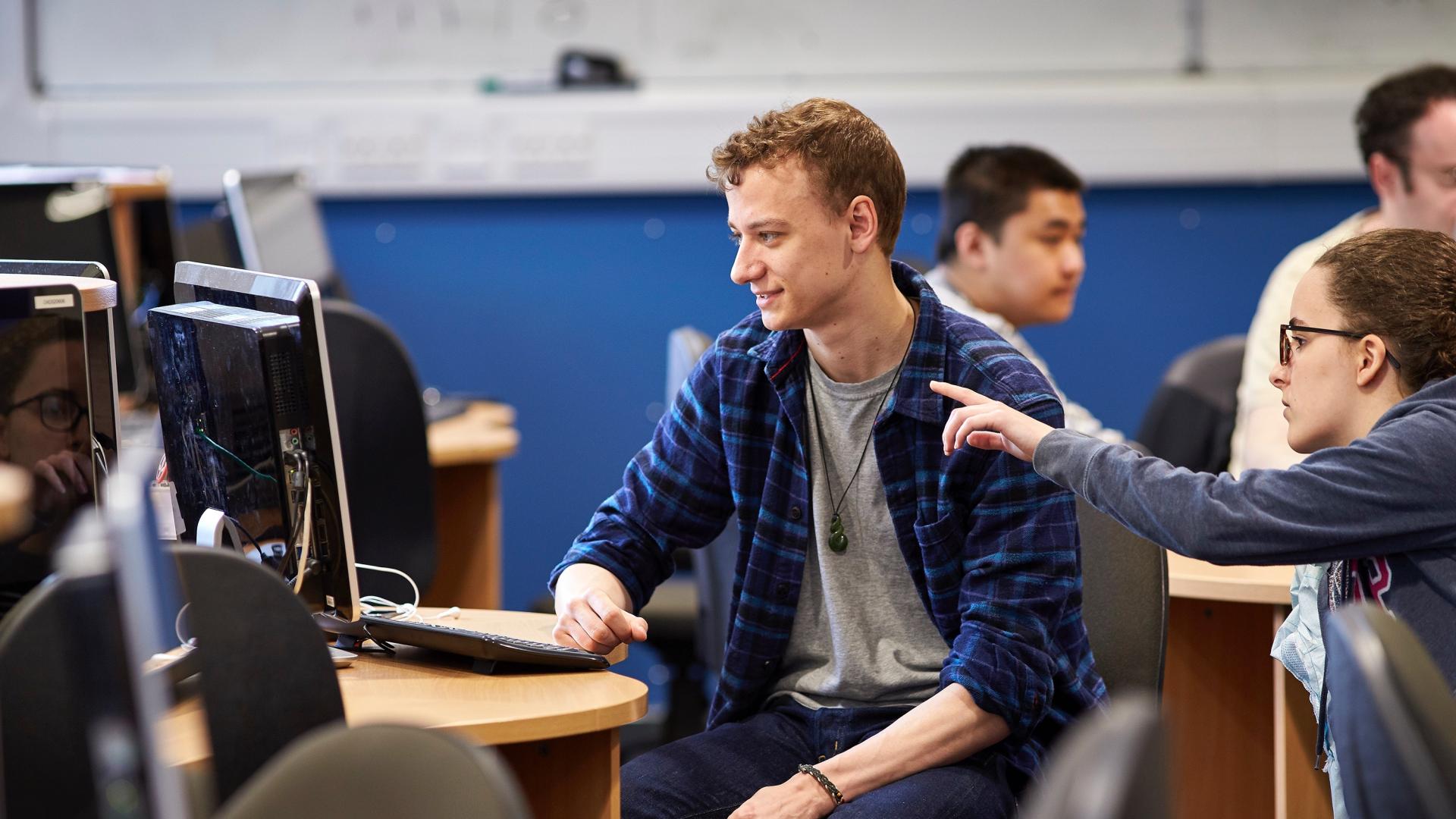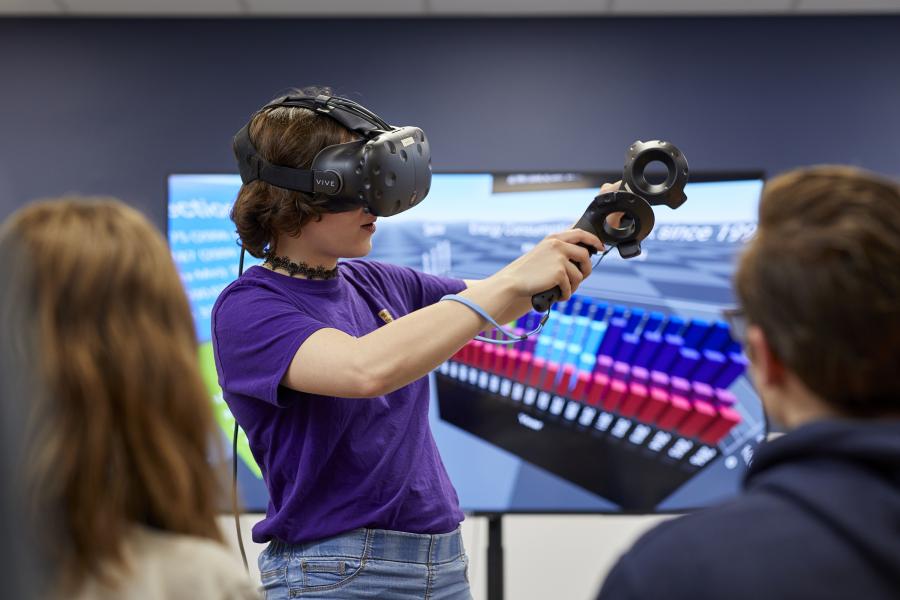About This Course
Please note: This course is not open to international students.
This Applied Software Engineering Degree Apprenticeship provides an alternative route to traditional higher education – combining work with college and university study. This course is designed to allow those who are currently working in the Software and ICT sectors to enhance their skills, knowledge and competence and gain a degree, while remaining in full-time employment.
This qualification encompasses a wide range of skills necessary for success in the IT sector. Indicative aspects develop from the computing foundations to programming with Python, C# and web-based enterprise Java, creating websites using HTML5/CSS and User Experience (UX) and HCI, development of mobile phone apps, formal software engineering methods, security and, also in the final year the apprentices will undertake projects linked to their workplace. Additionally, the learners will also be able to consider and investigate new technology that is constantly being introduced, how it can be used and the ethical considerations.
The course is run through a combination of day-release study at Coleg Llandrillo and Bangor University and structured work-based learning. You will develop competencies to a sufficient level to register for the ICT Technician qualification from the IET (ICTTech).
The course is fully funded by the Higher Education Funding Council for Wales. To apply for this course you or your employer must contact us directly.
Duration
Students will usually undertake academic study for one day and one evening per week for three years.
Location
For the first two years, our digital degree apprenticeship programmes are usually undertaken at colleges in either Deeside and Wrexham or Rhos-on-sea, and our engineering degree apprenticeship programmes are taught at colleges in Llangefni or Rhos-on-Sea. The final year of the apprenticeship teaching will be at Bangor University.
Why choose Bangor University for this course?
- This course is fully-funded by the Higher Education Council for Wales, this means you can gain a degree without any debt and your employer gains a member of staff with more skills that are directly related to the business.
- The contribution your employer must make is to release you from work to attend college/university one day per week.
- You remain in employment while you study for your degree. Students on this course will start at an entry point that is most appropriate to them, based on relevant experience or previous education. This means you will not be asked to repeat previous achievement, rather build upon existing knowledge and extend your future potential.
- Students who undertake this programme will benefit from being able to increase their skills and progress in their career. This course will ultimately enable you to help your employer’s business develop.
- You will have access to all the resources available at college and university, giving you the flexibility of two dynamic learning environments.
Course Content
The course is delivered through interactive lectures, tutorials and workshops. There will also be presentations by guest speakers. Learning is practical and informal. You’ll be assessed through a variety of methods such as practical and theoretical assignments, reports, oral presentations, project work, portfolios and team-based assignments.
Modules for the current academic year
Module listings are for guide purposes only and are subject to change. Find out what our students are currently studying on the Applied Software Engineering Degree Apprenticeship BSc (Hons) Modules page.
Course content is for guidance purposes only and may be subject to change.
Facilities
Engineering facilities
- Large fully equipped computing laboratories and all the latest software.
- A recently installed immersive technologies laboratory, where the latest devices are used for project and research work.
- A recently installed large networking laboratory to provide students with the opportunity to design and administer networks and for the teaching of computer architecture modules.
- A large undergraduate teaching laboratory, full of industry standard equipment.
- This is where you will undertake practical sessions put into practice what you have learned in your lectures.
- A class 1000 clean room which all undergraduate students will experience during their studies. This will give you unique training in clean room protocols which is invaluable experience when you are looking for jobs after your degree.
General University Facilities
Library and Archive Services
Our four libraries provide a range of attractive study environments including collaborative work areas, meeting rooms and silent study spaces.
We have an extensive collection of books and journals and many of the journals are available online in full-text format.
We house one of the largest university-based archives not only in Wales, but also the UK. Allied to the Archives is the Special Collections of rare printed books.
Learning Resources
There is a range of learning resources available, supported by experienced staff, to help you in your studies.
The University’s IT Services provides computing, media and reprographics facilities and services including:
- Over 1,150 computers for students, with some PC rooms open 24 hours a day
- Blackboard, a commercial Virtual Learning Environment, that makes learning materials available on-line.
Course Costs
This course is fully funded, subject to confirmation from HEFCW, which covers the full course tuition fees of £27,000 (i.e., £9000 per year per student over 3 years).
Fees may be increased in subsequent years of study by an inflationary amount determined by Welsh Government. The tuition fees do not cover the costs of purchasing books or stationery, printing, thesis binding or photocopying costs.
There are no mandatory additional costs for this course.
Entry Requirements
- Students need to be in either full or part-time employment (minimum 16 hours a week) in the IT industry.
- All applicants will be considered on a case by case basis and will be expected to attend an informal interview.
How to Apply
For all Degree Apprenticeships, apply directly with the help of our Guidance Notes.
Once you have read the Guidance Notes you should apply using our Online Application form.





